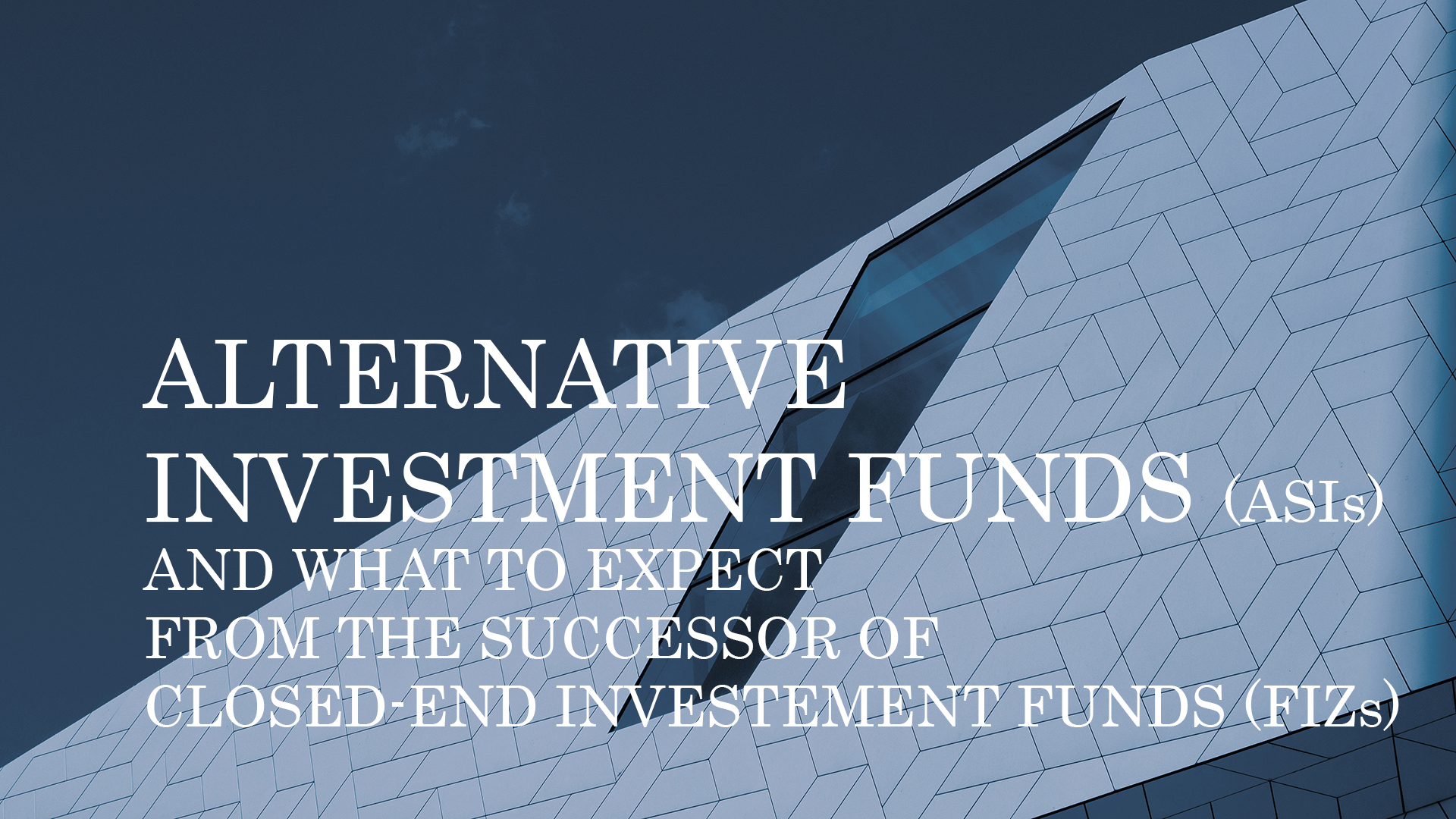ALTERNATIVE INVESTMENT FUNDS (AIFs) IN PRACTICE

We have written at length about Alternative Investment Funds in our blog. On how they compare with closed-end funds (the ever popular FIZs), as well as the process of registering an AIF with the Registry of AIF Managers administered by the Polish Financial Supervision Authority, about the practical aspects of running an AIF, along with the reporting and information obligations. On this occasion we are focusing on the opportunities offered by this popular investment vehicle. Using our experiences as examples we demonstrate how it is used in practice.
Permissible activities for an AIF what and is actually possible?
It is worth noting that the sole object of an Alternative Investment Fund should be to aggregate assets from multiple investors to redeploy them on their behalf and to their benefit. It is not about the statute or what is disclosed in the National Court Register of entrepreneurs, but about the activity actually performed by AIF! The legislator has assumed that this activity is to solely consist of the acquisition of assets, generically listed in internal documents (investment policies/strategies) with the intention of further investments in the manner chosen by the AIF.
What does this mean in practice? A business is free to choose how to invest its assets, with the proviso that all actions taken by the AIF in this respect are aimed at benefiting the investors of the AIF. It means that any “additional” activity undertaken by an AIF creates the risk of losing accreditation by the Polish Financial Supervision Authority and the removal from its register. However, trade practice has made it possible to distinguish certain activities considered as additional, but still acceptable by the AIF manager (internal or external). These include in particular customer service activities, administration of units and shares, activities related to the assets of the AIF, such as providing typified advice within a capital structure. To qualify as acceptable, all those activities must strictly relate to the investment activities of the AIF or the companies it manages. Only in this case will they be considered acceptable and linked to the purpose of the AIF. Example activities are:
- conducting pre-investment analyses;
- carrying out due diligence of assets of entities considered potential investment targets for the AIF;
- advising on the acquisition or disposal of parts of investments;
- carrying due diligence of the legal, financial or factual status of investments;
- current management activities regarding the AIF’s existing assets, related to business activities or the exercise of the AIF’s corporate rights;
- negotiating investment terms;
- updating the AIF’s investment policies;
- risk management of the activities performed by the AIF, including undertaking activities aimed at optimising investment risks in relation to the financing possibilities and objectives of the AIF’s operations.
How to structure an AIF – practical examples
AIF as a private investment vehicle
A Client of ours decided to rebuild their closed-end investment portfolio and establish an AIF. The decision was made to liquidate the FIZ, the maintenance costs of which were extremely high for the Client. The solution was to repackage the Client’s assets out of the fund into a newly created AIF, and then liquidating the former. Of course the main reason for this decision was a significant reduction in costs (by over PLN 25,000 per month!) The significant costs related to the running of the fund that have dropped off were the remuneration of the Investment Fund Company, the depositary, the costs of quarterly valuations and audits. What’s more the cost related to fulfilling the reporting obligations towards the regulator have also gone down. Those obligations are incomparably smaller for Alternative Investment Companies registered with the registry of AIF managers and thus do not generate as much cost as in the case of managing a FIZ.
A portfolio of companies managed under an AIF structure is a classic investment structure built for a single private investor. Wait a minute – an attentive reader might say – but the law regulating alternative mutual funds introduces a requirement for AIFs to have multiple investors! However, as the PFSA explains, the main criteria may be met even if the entity actually has only one investor. The concept of having multiple investors should not (according to the PFSA) be interpreted as an obligation for AIFs to have a minimum of two investors at all times. This means that having only one investor in a given situation will not always be a circumstance that excludes the entity from being classed as an AIF. However, it must be permanently open to external capital.
Starting an AIF from nothing
Another way of using AIFs is to build a track record which will allow to attract investors. In this way, the newly founded AIF starts its business on the basis of specific underlying instruments such as shares, exchange rates, interest rates or raw materials, with funding capital and goes on to build results from there that allow it to raise capital from the market.
In this instance the strategy of introducing investors plays a key role, because one of the main goals of the founders was to avoid dilution. Hence why it was important to select the most adequate form of investor participation, which on the one hand should be optimal in terms of business and tax, and on the other hand should allow to preserve the objectives of the founders.
Should the choice perhaps be a simple joint-stock company
There is a new form of capital company, called simple joint-stock company (P.S.A.) which could also be an interesting structure for businesses based on investors’ capital.
It is an altogether different matter whether a simple joint-stock company can achieve alternative investment company status. The website of the Polish Financial Supervision Authority asks this question “What forms of AIFs are allowed by law?” And provides the following answer: AIFs can operate in the form of a capital company, including a European company.” Furthermore, the Commercial Companies Code clearly states that a simple joint-stock company is also considered to be a capital company. Does this mean that a simple joint-stock company can be an AIF?
Despite the above, the answer should (likely) be in the negative, and that’s because the Investment Funds Act does not refer to “capital companies” but directly lists what legal forms of companies can become AIFs (internally or externally managed) and among the former are: limited companies, joint-stock companies and European companies. Simple joint-stock companies are not listed, which is incomprehensible and seems to be an oversight from the legislator, who when introducing the provisions for a simple joint-stock company into the Commercial Code of Companies, forgot to add it to the Investment Funds Act as an acceptable form of AIF (the same happened with the Act on Taxation on Civil Law Transactions). This is probably the reason why, among almost 300 entities, P.S.A.s are not listed in the register of internally managed AIFs. However, I would not be surprised if simple joint-stock companies started to appear as AIFs through market practice. All you need is a determined investor and a deftly arguing lawyer, and perhaps the KNF will succumb to such pressure 😉
Truthfully a simple joint-stock company is only simple in name, as over 130 new legal articles have been introduced to regulate it, all this creates a completely new and comprehensive set of rules for P.S.A.s, but it also puts in place several interesting flexible solutions for start-ups, such as the opportunity to include the provision of sweat equity as a contribution to a company, a straightforward way to dispose of shares, which is helpful in various forms of investor participation, e.g. crowdfunding. At the same time, it gives the opportunity to avoid dilution of the founders’ share capital. So far, it has not gained too much popularity, but the uptake was initially similarly low with AIFs themselves.
In summary
Undoubtedly AIFs are very flexible instruments for conducting investment activities. In order to take advantage of them for specific activities requires proper planning out of all the accompanying mechanisms such as for example: investor entry, payment of coupons, maintaining control and the flow of information to all stakeholders.
Alternative options should also be considered when planning and structuring the overall arrangement of such an investment tool. A good example is the simple joint-stock company mentioned above. But this is not the only option. Sometimes an ordinary limited liability company will be sufficient, and sometimes one can look more broadly and consider building their corporate structure around a foreign entity. There are multiple solutions and a thorough analysis should always be carried out to choose the instruments that best fit the business plans of individual businesses.

Blog edited by dr Anna Maria Panasiuk

Founder and Managing Partner of Panasiuk & Partners, with many years of expertise in wealth management.
Authors
dr Maja Czarzasty- Hercberg
OF COUNSEL/ATTORNEY-AT-LAW
Dorota Sajewicz
investment partner
dr Adam Barcikowski
Head of Tax | Certified Tax Advisor
Marta Kwiatkowska - Abramowska
legal assistent
Sylwia Rozwandowicz
ADVOCATE
Sylwia Rybicka
dyrektor ds. rozwoju
Michał Nowacki
radca prawny
Paweł Turek
doradca podatkowy
Katarzyna Zając
aplikant radcowski
Yours Panasiuk
Antoni Goraj
radca prawny
Edyta Winnicka
prawnik
Paweł Szumowski
aplikant radcowski
Yours Panasiuk
Katarzyna Bieńkowska
radca prawny,
doradca podatkowy YOURS Panasiuk
Kamil Kowalik
doradca podatkowy
Monika Baran
radca prawny
Adam Apel
doradca podatkowy
Piotr Świąć
adwokat
Sabina Tyszko
tax consultant
Szczepan Adamski
OF COUNSEL | LAWYER | PRESIDENT OF THE MANAGEMENT BOARD OF YOURS SP. Z O.O.
Magda Kwiatkowska
radca prawny
Andrzej Sałamacha
PARTNER | ATTORNEY-AT-LAW | CERTIFIED INSOLVENCY AND RESTRUCTURING ADVISOR
dr Anna Maria Panasiuk
managing partner | advocate | wealth advisor
Maciej Małachowski
TRAINEE ATTORNEY-AT-LAW
Klaudia Borkowska
Advocate trainee
Archives
-
2024

-
2023

-
2022

-
December

- POLISH FAMILY FOUNDATION – A new solution for entrepreneurs
- POLSKA FUNDACJA RODZINNA – nowe rozwiązanie dla przedsiębiorców
- INVESTMENT FUNDS IN THE NETHERLANDS – ABC OF SETTING UP OF AIF
- FUNDUSZE INWESTYCYJNE W HOLANDII – ABC ZAŁOŻENIA AFI
- TAX INCENTIVES TO INVEST IN AN ALTERNATIVE INVESTMENT FUND (AIF)
- ZACHĘTY PODATKOWE DO INWESTYCJI W ALTERNATYWNĄ SPÓŁKĘ INWESTYCJNĄ (ASI)
-
November

-
October

- CAN AN ALTERNATIVE INVESTMENT FUND SERVE THE PURPOSES OF PRIVATE INVESTMENTS?
- CZY ALTERNATYWNA SPÓŁKA INWESTYCYJNA MOŻE SŁUŻYĆ PRYWATNYM INWESTYCJOM?
- M&A – TRANSACTION TRIVIA IN MERGERS & ACQUISITIONS
- M&A – CIEKAWOSTKI TRANSAKCJI MERGERS & ACQUISITION
- HISZPAŃSKA REZYDENCJA PODATKOWA – PUZZLE DLA WTAJEMNICZONYCH!
- Spanish tax residence – jigsaw puzzles for the initiated!
-
September

-
August

-
July

-
May

- PODWÓJNA REZYDENCJA PODATKOWA – 4 PRZYKŁADY POWSTANIA [CZĘŚĆ II OSOBY PRYWATNE]
- DUAL TAX RESIDENCE – 4 EXAMPLES OF ITS EMERGENCE [PART II NATURAL PERSONS]
- INVESTORS’ Q&A ABOUT THE ALTERNATIVE INVESTMENT FUNDS
- O CO NAJCZĘŚCIEJ PYTAJĄ INWESTORZY W KONTEKŚCIE ASI (ALTERNATYWNYCH SPÓŁEK INWESTYCYJNYCH)?
- REVOLUTION ON THE MERGERS & ACQUISITIONS MARKET – RECORD-BREAKING M&A TRANSACTIONS IN POLAND
- REWOLUCJA NA RYNKU FUZJI I PRZEJĘĆ – REKORDOWE TRANSAKCJE M&A W POLSCE
- 7 SINS COMMITTED WHILE RUNNING A BUSINESS AND MAKING INVESTMENTS
- 7 GRZECHÓW PRZY PROWADZENIU BIZNESU I INWESTYCJACH
-
April

-
March

-
February

- SIMPLE CONSERVATIVE INVESTMENTS. HISTORICAL ANALYSIS OF THE LAST 20 YEARS
- PROSTE INWESTYCJE KONSERWATYWNE. ANALIZA HISTORYCZNA OSTATNICH 20 LAT
- CZY WARTO ZAMIESZKAĆ W HISZPANII? PRAWO BECKHAMA, CZYLI JAK NIE PŁACIĆ PODATKÓW W HISZPANII
- IS IT WORTH LIVING IN SPAIN? BECKHAM ‘S LAW, HOW TO AVOID PAYING TAXES IN SPAIN
- ESTONIAN CIT 2022 AS A REMEDY FOR THE POLISH DEAL
- ESTOŃSKI CIT 2022 JAKO REMEDIUM NA POLSKI ŁAD
-
January

- HOW CAN YOU SET UP AN ALTERNATIVE INVESTMENT FUND IN A FEW WEEKS?
- JAK MOŻNA ZAŁOŻYĆ ALTERNATYWNĄ SPÓŁKĘ INWESTYCYJNĄ W KILKA TYGODNI?
- DO CLOSED-END INVESTMENT FUNDS STILL PAY OFF?
- CZY FUNDUSZE INWESTYCYJNE ZAMKNIĘTE JESZCZE SIĘ OPŁACAJĄ?
- 6 REASONS WHY IT IS WORTH DEVELOPING A BUSINESS OUTSIDE POLISH BORDERS
- 6 POWODÓW, DLA KTÓRYCH WARTO ROZWIJAĆ BIZNES POZA POLSKĄ
-
December
-
2021

-
December

-
November

-
October

- LIFE IN TENERIFE – TAXES AND REAL ESTATE IN THE CANARY ISLANDS
- TENERYFA NA ŻYCIE – PODATKI I NIERUCHOMOŚCI NA WYSPACH KANARYJSKICH
- TURNKEY REORGANISATION – HOW TO PREPARE A BUSINESS FOR INTERNATIONAL EXPANSION
- REORGANIZACJA POD KLUCZ CZYLI JAK PRZYGOTOWAĆ BIZNES NA EKSPANSJĘ ZAGRANICZNĄ
- BUSINESS EXPANSION OUTSIDE THE EU – LET’S HAVE A LOOK AT OTHER CONTINENTS
- EKSPANSJA BIZNESU POZA UE – SPÓJRZMY NA INNE KONTYNENTY
-
September

-
August

- MAJĄTEK RODZINNY
- COMPANY RELOCATION WITHIN THE EU: PROCESS ANALYSIS AND CASE STUDY
- PRZENIESIENIE SPÓŁKI W OBRĘBIE UE: ANALIZA PROCESU I CASE STUDY
- SCALING UP BUSINESS. TAXES IN ESTONIA, ITALY, UNITED KINGDOM, MALTA AND CYPRUS – COMPARISON
- EKSPANSJA BIZNESU. PODATKI W EUROPIE.
- POLSKI ŁAD OCZAMI PRZEDSIĘBIORCY
-
July

- EXPANDING NEXT DOOR – THE CZECH REPUBLIC, SLOVAKIA, GERMANY, ROMANIA
- EKSPANSJA PO SĄSIEDZKU – CZECHY, SŁOWACJA, NIEMIECY, RUMUNIA
- CONVERTIBLE DEBT IN POLAND
- CONVERTIBLE DEBT PRZY INWESTYCJACH PRE-SEED
- AIFs (ALTERNATIVE INVESTMENT FUNDS) LEAD THE WAY ON THE POLISH CAPITAL MARKET
- ASI WIEDZIE PRYM NA POLSKIM RYNKU KAPITAŁOWYM
- FAMILY FOUNDATIONS IN POLAND. CONCEPT VERSUS ENTREPRENEURS’ EXPECTATIONS
- FUNDACJA RODZINNA W POLSCE. ISTOTA POMYSŁU A OCZEKIWANIA PRZEDSIĘBIORCÓW
-
June

- CORPORATE TAX RELIEF AND INCENTIVES FOR INVESTORS – NEW (BETTER?) SOLUTIONS
- ULGI PODATKOWE I ZACHĘTY DLA INWESTORÓW – IDZIE NOWE (LEPSZE?)
- 9% CIT ZAMIAST 19%, JAK PŁACIĆ NIŻSZY PODATEK
- CYPRUS VS. UNITED ARAB EMIRATES, WHERE TO MOVE? CHANGE OF TAX RESIDENCE
- CYPR VS. ZJEDNOCZONE EMIRATY ARABSKIE, GDZIE SIĘ WYPROWADZIĆ? ZMIANA REZYDENCJI PODATKOWEJ
-
May

-
April

-
March

-
February

-
January

- 6 MAJOR CHANGES IN THE BEHAVIOUR OF PRIVATE INVESTORS AND THEIR PORTFOLIOS IN 2020
- 6 GŁÓWNYCH ZMIAN W ZACHOWANIACH I PORTFELACH INWESTORÓW PRYWATNYCH W ROKU 2020
- TAX SIMPLIFICATION 2021 IN POLAND – A MAGNET FOR FOREIGN INVESTORS
- UPROSZCZENIA PODATKOWE 2021 W POLSCE – MAGNESEM DLA INWESTORÓW ZAGRANICZNYCH
- ALTERNATIVE INVESTMENT FUND (AIF) – A FIRST-CLASS INVESTMENT VEHICLE AT YOUR FINGERTIPS
- ALTERNATYWNA SPÓŁKA INWESTYCYJNA (ASI). PIERWSZORZĘDNY WEHIKUŁ INWESTYCYJNY NA WYCIĄGNIĘCIE RĘKI
- ESTONIAN CIT – EFFECTIVE REDUCTION IN CORPORATE TAX IN POLAND
- CIT ESTOŃSKI – EFEKTYWNE OBNIŻENIE OPODATKOWANIA SPÓŁEK W POLSCE
-
December
-
2020

-
December

-
November

- WE BREAK STEREOTYPES! PRECONCEPTIONS ABOUT LAWYERS AND THE REALITY OF BUSINESS
- AM I REALLY SAVING MYSELF MONEY? TODAY I WILL SAVE 100 PLN TO LOSE 1000 PLN TOMORROW
- ŁAMIEMY STEREOTYPY! CZYLI PRZEKONANIA O PRAWNIKACH, A REALIA BIZNESU
- CZY TO NAPRAWDĘ OSZCZĘDNOŚĆ? DZIŚ „ZAOSZCZĘDZĘ” 100 ZŁ ŻEBY JUTRO STRACIĆ 1000 ZŁ
- ZAPRASZAMY do MONAKO
- WHY IS IT WORTH BECOMING A TAX RESIDENT OF MONACO?
- DLACZEGO WARTO ZOSTAĆ REZYDENTEM MONAKO? PODATKI W MONAKO
-
October

-
September

-
August

-
June

- THE WORLD IS CHANGING, AND YOU ARE STILL LOOKING FOR A UNICORN? In this article, we tell you everything you need to know to find one
- ŚWIAT SIĘ ZMIENIA, A TY WCIĄŻ SZUKASZ JEDNOROŻCA. Wszystko co musisz wiedzieć aby go znaleźć napisaliśmy tutaj
- KRYZYSOWE INWESTYCJE, CZYLI: ODWAŻNA INWESTYCJA WYMAGA OSTROŻNEGO PLANOWANIA
- JAK TRWOGA TO DO PRAWNIKA – NIEPOKOJĄCE TENDENCJE WŚRÓD STARTUPÓW
-
May

-
April

- AMERICAN TAX COMPETITION. HELPFUL OR “HARMFUL”
- KONKURENCJA PODATKOWA PO AMERYKAŃSKU. POŻĄDANA, CZY „SZKODLIWA”
- PIENIĄDZE TO NIE WSZYSTKO. Czyli jak inwestować, żeby nie stracić
- INVESTING IN HARD TIMES: HOW TO SET UP YOUR BUSINESS IN NEW YORK
- APETYT NA INWESTYCJE W TRUDNYCH CZASACH. SPÓŁKA W NOWYM YORKU
- WPŁYW PANDEMII NA TRANSAKCJE FUZJI I PRZEJĘĆ
- IMPACT OF A PANDEMIC ON MERGERS AND ACQUISITIONS
- PODATKI NA TRUDNE CZASY
-
March

-
February

-
December
-
2019

-
2018

-
2017

-
2016

-
2015

-
December

-
November

- Zwrot PCC od czynności restrukturyzacyjnych z udziałem spółek komandytowo-akcyjnych
- Zmiany podatkowe na Cyprze zachętą dla potencjalnych inwestorów
- Cypryjskie fundusze inwestycyjne mogą korzystać ze zwolnienia podatkowego w Polsce
- Nowe sankcje za niezłożenie sprawozdania finansowego
- Europejskie poświadczenie dziedziczenia
-
October

-
July

-
December
Categories
- Alternative Investment Fund (15)
- Expansion (12)
- Investments (34)
- Jurisdictions (11)
- Law (13)
- M&A (11)
- POLISH FAMILY FOUNDATION (2)
- Polish Holding Company (2)
- Relocation (9)
- Reorganisation (6)
- Succession (9)
- Tax (28)
- Tax accounting (2)
- Tax Preferences (2)
- Tax Residence (10)
- Wealth Advisory (9)
New publications
You want to be up to date, enter your e-mail address and you will receive new publications straight to your inbox:

